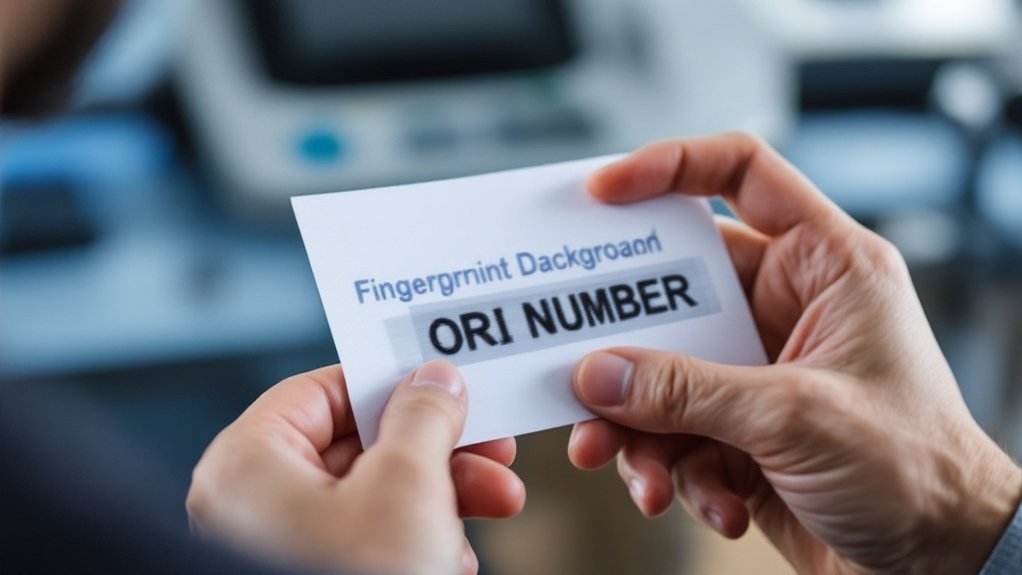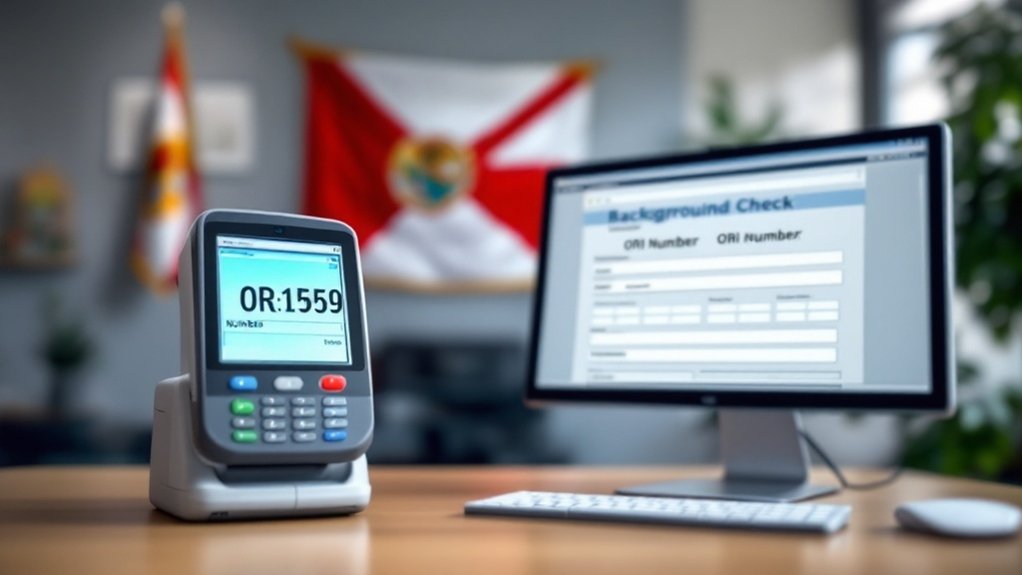You need an ORI number for Florida background checks, especially Level II checks, because it uniquely identifies the requesting agency and directs results to the correct state department. This guarantees compliance with specific statutes and regulations governing your profession. The ORI number informs law enforcement about relevant statutes and offenses to scrutinize, securing accurate processing and delivery of screening results. By understanding ORI numbers, you can navigate the background check process more effectively and guarantee compliance with Florida’s legal mandates.
Understanding ORI Numbers

Understanding ORI numbers is essential for anyone involved in Level II background checks in Florida. An ORI, or Originating Agency Identifier, is a unique 9-digit code assigned to agencies by the FBI. It identifies which agency is requesting a background check and guarantees results are routed correctly. Typically, an ORI starts with letters identifying the state or agency, followed by numbers. In Florida, ORI numbers are required for Level II checks and often include abbreviations of the requesting agency, such as AHCA or DCF. You’ll need to know your ORI number to complete a background check, as it specifies where the results should be sent. The ORI is crucial because it meets established qualifying criteria for assignment, ensuring that only authorized agencies can access criminal justice information through systems like the NCIC, using a nine-character identifier.
The Role of ORI in Background Checks
As you navigate the process of Level II background checks in Florida, it’s indispensable to grasp the pivotal role ORI numbers play. They serve as identifiers for the requesting agency, informing law enforcement about governing statutes, specific offenses to scrutinize, and where to send results. This guarantees accurate processing and delivery of screening results.
In Florida, ORI numbers are crucial for maintaining compliance and distinguishing between different background checks. They act as routing numbers for electronic delivery and ensure checks are conducted according to specific requirements. Incorrect ORI numbers can lead to delays, additional costs, and invalid checks, affecting regulatory compliance and causing confusion in the screening process. Additionally, the ORI number must be used in conjunction with an OCA number to ensure that the Florida Department of Law Enforcement (FDLE) can process the request and send the results to the correct entity.
Obtaining Your ORI Number

When obtaining your ORI number, you’ll typically receive it from your employer if you’re applying for a job that requires a Level II background check. If your employer doesn’t have the ORI number, you can contact the relevant regulatory agency for assistance. Additionally, if you’re applying for a license, the ORI number will usually be provided as part of the application process. Knowing your ORI number is crucial because it ensures that your background check results are sent to the correct agency, which is essential for completing the background check process.
Obtaining Your ORI Number
To obtain your ORI number, you’ll need to understand its role in the background check process. ORI numbers are vital for directing background check results to the correct agency. Typically, your employer will provide the ORI number if you’re applying for a job that requires a Level II background check. If you’re applying for a license, the ORI number will be part of the application process. For court-related matters, you should contact the Clerk of Court directly. It is of the utmost importance to verify the ORI number with the requesting agency to guarantee accuracy and compliance with relevant statutes. Ensuring that you have the correct ORI number is crucial because it identifies the specific agency associated with the background check and ensures that results are sent to the appropriate department.
License Applications
In the context of license applications, obtaining the correct ORI number is indispensable for ensuring that background check results are directed to the appropriate board office. You must provide accurate demographic information, including your social security number, as it is a statutory requirement. The ORI number structure typically consists of two state-identifying characters followed by six to seven additional characters. Examples include EAHCA020Z for healthcare professionals and EDCFGN10Z for child care workers. Using the correct ORI number is vital; otherwise, the board office may not receive your fingerprint results. You can find the necessary ORI numbers during the application process or by contacting the relevant agency. Additionally, the ORI number ensures that the results are sent to the correct state department, which is crucial for Level 2 Background Checks.
Employer Assistance
Employers play a pivotal role in facilitating background checks by providing applicants with the correct ORI number. This guarantees compliance with relevant statutes and regulations governing background checks. You must contact the appropriate Florida agency to confirm the correct ORI number for your industry, as different sectors have unique numbers. During the hiring process, you’ll often provide the ORI number as part of the employment application. It’s indispensable to maintain accurate records of these numbers and stay updated on regulatory changes to avoid delays or legal issues.
As you navigate this process, remember that the ORI number directs background check results to the correct agency, ensuring legal validity and facilitating coordination between the FBI and FDLE. Employers must ensure that they provide the correct ORI number to applicants, as this identifier is crucial for ensuring that the background check results are processed according to the relevant statutes and sent to the appropriate agency.
Importance of ORI Numbers in Florida
ORI numbers play a pivotal role in ensuring the accuracy and efficiency of background checks in Florida. They serve as unique identifiers for agencies or individuals requesting background checks, ensuring results are sent to the correct entity. You’ll need an ORI number for Level 2 checks, which informs the FDLE and FBI about relevant statutes and offenses to scrutinize. This number directs where results should be sent upon completion, ensuring compliance with regulatory requirements for various professions.
As you navigate the background check process, remember that ORI numbers are essential for healthcare professionals, educators, business license holders, and government agencies. Employers typically provide these numbers during the hiring process.
ORI Numbers and Legal Compliance

As you navigate the process of Florida background checks, understanding ORI numbers is vital for legal compliance. You will need an ORI number to guarantee that your Level 2 background check is processed correctly, as it identifies the requesting agency and ensures results are routed appropriately. By using the correct ORI number, you ascertain that your background check complies with relevant statutes and is delivered to the right agency, preventing delays or invalid results. Additionally, the ORI number is crucial because it determines the associated fees that must be paid during the background check process.
ORI Numbers and Legal Compliance
When you’re involved in a background check process in Florida, understanding the role of ORI numbers is indispensable for guaranteeing legal compliance and efficient processing. ORI numbers identify the requesting agency, inform the FBI and FDLE about relevant statutes, and determine where results are sent. Incorrect numbers can lead to delays or misrouting of results. Employers typically provide the ORI number during hiring, and it’s essential for Level II background checks. Confirming the ORI number ensures accurate processing and compliance with regulations. This standardization helps streamline background checks, guaranteeing timely and accurate delivery of results. Additionally, obtaining the correct ORI number is crucial because it must be provided by the employer, ensuring that the background check is conducted for the correct purpose.
Legal Mandate
In Florida, the legal mandate surrounding background checks, particularly Level 2 checks, emphasizes the critical role of ORI numbers in ensuring compliance and efficiency. These numbers are essential for identifying the requesting agency and ensuring results are correctly routed. They inform the FBI and FDLE about relevant statutes and offenses to scrutinize, making them indispensable for legal compliance. You must provide accurate ORI numbers to avoid delays in hiring or licensure. Failure to comply can lead to legal issues and compromise safety. ORI numbers are mandated for positions of trust, such as healthcare and education, ensuring background checks meet legal standards. Compliance is necessary for regulated fields, and incorrect numbers can prevent agencies from receiving results. Additionally, Level 2 background checks, which involve a fingerprint-based search, are crucial for ensuring that applicants have the right background for positions of trust, particularly in industries like healthcare and education.
State Requirements
Florida’s background check process, particularly for Level 2 checks, relies heavily on ORI numbers to guarantee compliance and efficiency. These numbers are 9-digit codes that identify the requesting agency and safeguard results are routed correctly. You’ll need a specific ORI number for your profession, whether you’re a healthcare provider or educator. This certifies that the background check aligns with relevant statutes and is processed according to legal requirements.
In terms of legal compliance, ORI numbers are pivotal for adhering to state and federal regulations. They act as a routing mechanism, directing results to the appropriate agency. This averts errors and guarantees that background checks are conducted according to the correct legal standards. Additionally, providing the correct ORI number ensures that the background check results are delivered to the right agency, which is crucial for maintaining legal compliance and avoiding resubmissions.
Using ORI Numbers With OCA Numbers
Using ORI numbers with OCA numbers is crucial for guaranteeing that background checks are processed accurately and efficiently. These identifiers work together to direct the results to the correct agency. The ORI number identifies the agency requesting the background check.
- Agency Identification: ORI numbers identify the agency requesting the background check.
- Purpose Specification: OCA numbers detail why the check is needed.
- Result Routing: Both numbers guarantee results are sent to the correct agency.
- Coordination with FDLE: They facilitate FDLE’s processing and delivery of background check results.
In Florida, obtaining an ORI number is essential because it ensures that the background check results are routed to the appropriate state department, such as the Florida Department of Law Enforcement, which handles Level II background checks.
Challenges and Solutions in ORI Number Management**

Managing ORI numbers effectively is essential for guaranteeing that background checks are processed correctly and efficiently. Incorrect ORI numbers can lead to delays or misrouting of results, causing inconvenience for applicants and employers. You may face challenges like lack of awareness about ORI numbers, complexity in their structure, and variability across professions.
To overcome these challenges, you can implement solutions such as clear communication of ORI numbers by employers, using prepopulated forms, and maintaining centralized resources. Training and standardization can also enhance understanding and compliance. By verifying ORI numbers with official resources and maintaining accurate records, you can streamline the screening process and guarantee compliance with regulations.
Conclusion
In Florida, having an ORI number is pivotal for background checks, acting like a key that opens the correct processing and delivery of results. It identifies the requesting agency and guarantees compliance with legal requirements. Without it, your background check is like a ship without a rudder—lost and unable to reach its destination. ORI numbers work in tandem with OCA numbers to streamline the process, ensuring that results are accurately routed and legally compliant.

